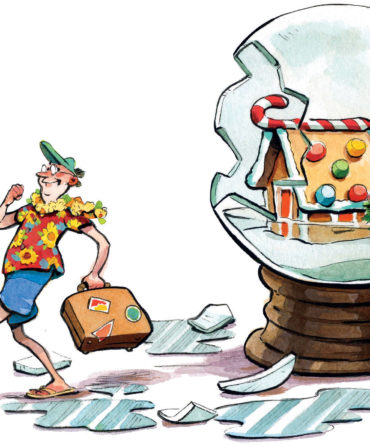We’ve been invited to a golf weekend at the beach to watch the Masters and play a few rounds. Thing is, everybody knows our hosts cheat. Do we call them out?
Any way you cut it, golf is our most rigorously social game. A code of manners comes very much attached, and, on the technical side, the sport carries an ancient and profound rule book. The rules themselves are strict, arcane, absurd, occasionally even maddening, and wholly, hilariously lovable. The rules are golf. We all try to live up to them. So here’s your mantra: Your hosts’ not trying to do that is not your problem. I can’t tell whether you’re talking about an extra mulligan here or there, or an “improved” lie when they think nobody’s looking, or whether there are darker, more arithmetic shenanigans, as in routinely forgetting a stroke or two, but it does sound like their reputation moves well beyond you. At any rate, with their general disregard for the game, your hosts are by definition taking themselves out of competition, exactly as would happen in a golf match. Certainly, the starter at their course will regard you as “a foursome,” and your hosts will, nominally, be hitting some golf balls with golf clubs as they stroll around the links, but they won’t be playing golf. What they’re telling you is, they don’t want to be measured against the grand architecture of the game, and yet, the whole Masters weekend invitation is in celebration of that. Funny, right? And oh-so-human. Practice forgiveness. It’s not your duty to remind them of their failures—since they remind themselves all the time, with the cheating, get me? Concentrate your dinner conversation on the leaderboard, or Tiger’s Comeback, whether or not he’s actually coming back. Among yourselves, on the trip back home, feel free to marvel at the many illuminating facets of the vast and colorful human spirit. They are infinite.
I just inherited an eighteenth-century spinning wheel. Should I give it to one of those villages where everyone pretends they’re living back in the day?
None of us get much chance to wear homespun these days, but in general, I loathe the idea of off-loading anything, useless or not, that the ancestors have had in their hands—born that way, I guess. The objects give off a sort of musical hum, or put another way, in them the rhythms of use by the human hand reside. It’s not that they’re old. It’s that the bearers of my DNA did things with these things. Among many other items he’s inherited, my father still has my grandmother’s big dun-colored butter churn, with its dowelled maple plunger and paddles. It could be that I have no “inner decorator,” or that I’m just plain lazy, because I can call my mother and get good advice, but I have no problem keeping any sort of handed-down furniture. English brown? Tons of it. Chippendale, chintz, any kind of sofa with ball-and-claw feet? Bring it. What editing? Nothing is ever out of fashion, or was ever really “in” fashion, either, in my domicile. I’m not sure a real decorator, very much including my mother, would say that any of it “goes” with anything else. But somebody back in the family thought it did, so my position is, it does.
Our neighbors have made a habit of stealing peaches from our trees. How do we fend off their sticky fingers?
Resolving farm crimes is like searching for peace in the Middle East: You have to try, but you have to prepare yourself that the effort will never end. Because: Somehow, in their ass-backward Snopesian selfishness, your neighbors have written it into the code that your trees are public property, available 24/7, thus are merely there to save them a trip to the Piggly Wiggly when they want to make a cobbler. First, try to embarrass them with a gift. When the early fruit is ready, take them a bushel with a note reading simply, “Enjoy.” If they are who I think they are, they’ll keep on stealing after they’ve run through it, but never mind, the tactical notion is that they will steal less as they eat that bushel. Next summer, you’re within your rights to attach a note to the tithed bushel suggesting that they curtail the discount shopping in favor of the gift. But—since thieves hate being called thieves—be mindful that this move could spark a war in which your orchard might truly suffer. So, you’ll be faced with a choice. You can endure your neighbors. But for a more defensible orchard perimeter, and possibly for peace of mind, I recommend you buy their house.








